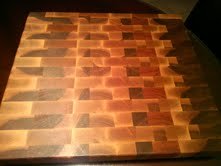Chef Maloney
Senior Cook
I purchased a new hardwood chopping block 18" x 16" from BBB and it's beautiful. I have read about seasoning it with mineral oil (usp) which I have done. 5 applications, waiting 8 hours between applications and 2 applications waiting overnight (to absorb & cure). THIS THING HAS A DRINKING PROBLEM. Would you believe this thing has swallowed 16oz. of mineral oil in the past 2 days? Should I keep applying mineral oil? Fortunately, I found the mineral oil at Target for $1.49 16oz. bottle. But this is KRAaZy.
ps. do i really need to do the bee's wax thing too?
Please Advise. Thanks
ps. do i really need to do the bee's wax thing too?
Please Advise. Thanks


